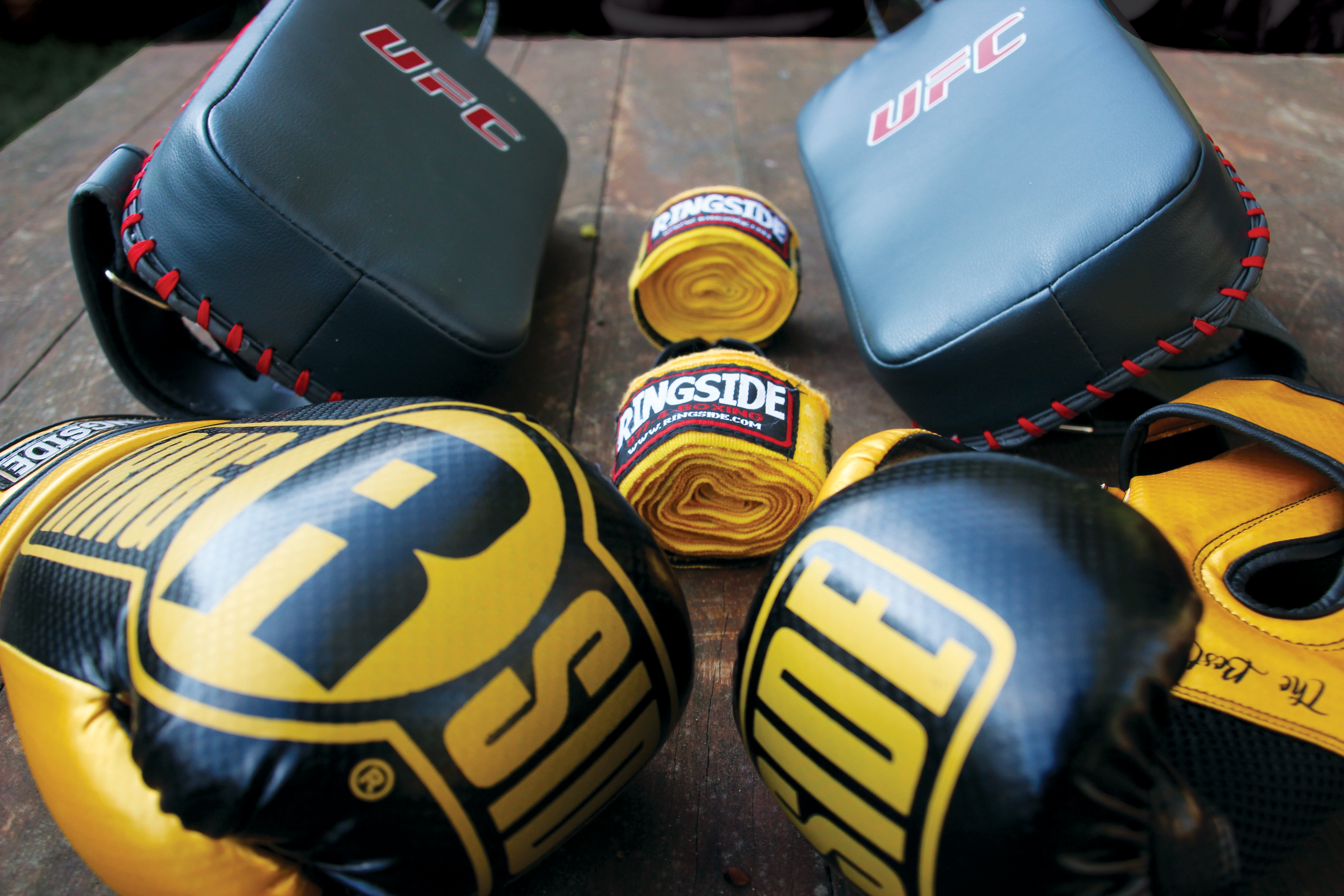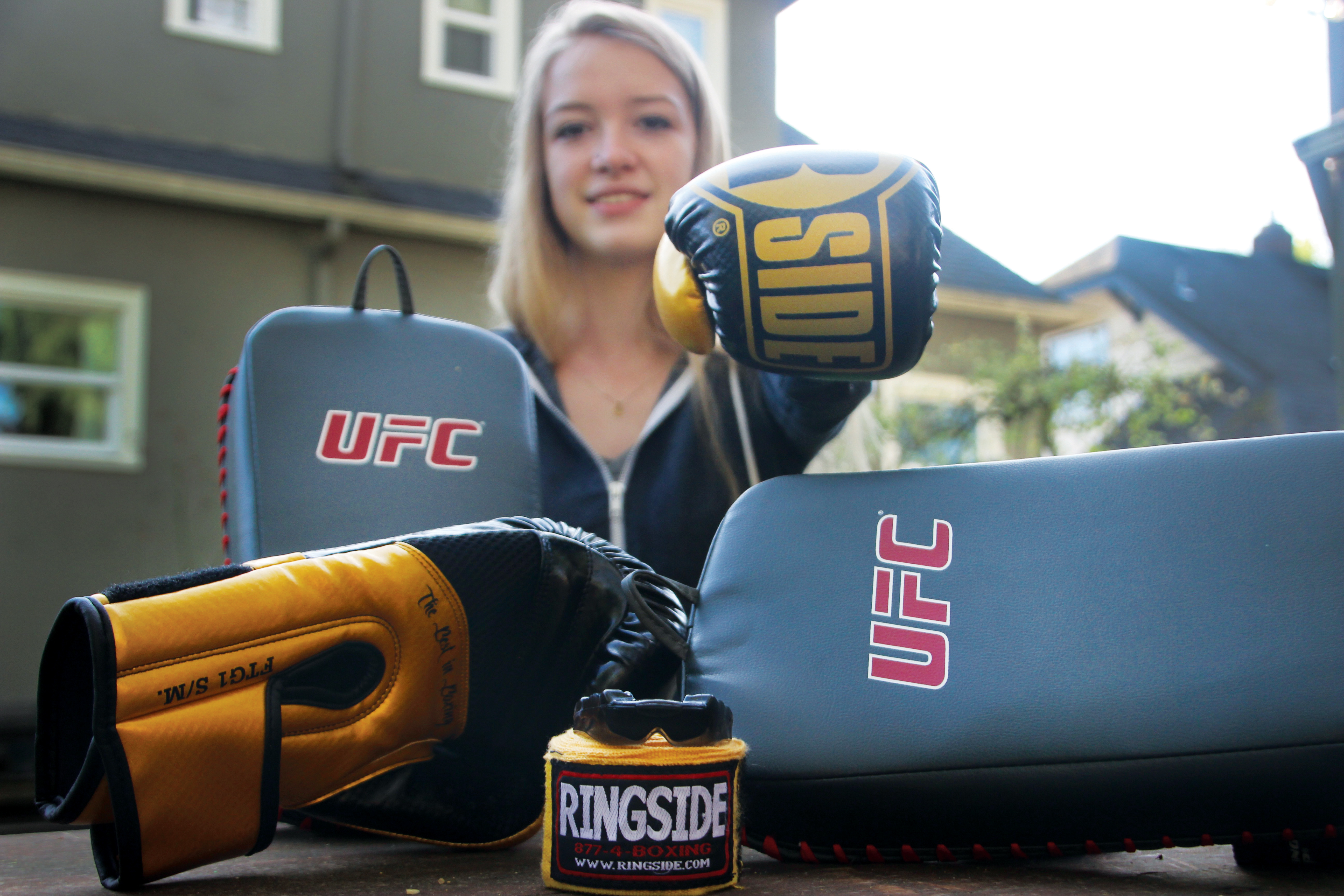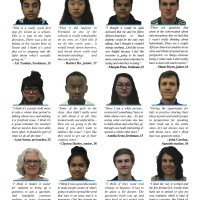It’s a Saturday afternoon at Northwest Fighting Arts and Grant High School senior Mira Herrick is finishing her hour-long training with as much energy as when she started. Her face flushed, she wipes off the beads of sweat and grabs a quick drink of water before she heads over to the wall lined with punching bags.
Herrick steps up to one, quickly shifts her weight and swings a kick into the bag. She kicks again, but the heavy bag doesn’t move enough to satisfy her. She can feel bruises forming on her shins.
At 5-foot-6 and 120 pounds, the bumps and bruises on her legs are indicators of a person who is training to fight in mixed martial arts. Herrick is fighting because it’s her out.
As a kid, she was bullied about her body type. And she lost her grandparents to violence two years ago. “There is no book on the planet that can prepare you for what she has had to go through,” says Herrick’s stepmom, Sarah King.
It wasn’t until she found Muay Thai, a form of mixed martial arts training, that she developed the physical and mental strength she needed to get her own life back on track.
“The gym was the one thing that could completely clear my head,” she says. “I could go there and escape everything.”
Herrick was born in Austin, Texas, on Aug. 28, 1998. Not long after she was born, her parents, Dan Herrick and Juliet Johnson, split up and agreed to share custody. Her dad later met Sarah King when his daughter was 2, whom he married. The three moved to Portland when Herrick was 4.
Growing up, Herrick was rarely surrounded by kids. From neighborhood barbeques and weekly dinner parties, her parents’ friends became the main source of her social hub.
“When she was younger, she didn’t always want to have play dates or sleepovers,” King recalls. “She wanted to be home and didn’t necessarily like spending a lot of time with kids her age. They were so loud, and she was this quiet kid, so sometimes I felt that she got very overwhelmed.”
Dan Herrick remembers the 1 a.m. phone calls from other parents when she wanted to leave sleepovers early to come home.
Herrick pretty much entertained herself. Art supplies cluttered the kitchen table, sheet music was scattered around the house and leftover flour from making dessert seemed a permanent part of the kitchen counter.
Her parents began to notice that Herrick being alone was becoming the norm.
“One time, we had a birthday party for her, and we had invited all of the kids from her kindergarten,” King remembers. “When we cut the cake, Mira took her piece on her plate, walked out to the front porch and shut the door and sat down by herself. And when the other kids found her, she just sighed and had this look on her face that she really just wanted to be alone.”
She started at Buckman for elementary school and attended the Metropolitan Learning Center for middle school. “Dan and I both do a lot of art and music so we sort of put her in those situations,” says King.
But spending so much time alone when she was younger became a problem. Interacting with kids was a daily struggle. Herrick felt like she couldn’t find the right words to carry on a conversation and avoided her peers. She spent most lunch periods alone in the library.
“It was less pressure,” she says. “I didn’t have to feel like no one wanted to be my partner or be the last person without a group.”
Then the bullying began. Kids in her class, as well as adults, began to taunt her over her petite stature.
“I distinctly remember in fifth grade my teacher would make fun of me, saying I only ate sticks and twigs because I was so small,” Herrick recalls. “People would say I was anorexic, which was always hard to deal with because I ate a ton of food and it wasn’t something I could change.”
Before long, she wanted the adults in her life to intervene.
“She was such a quiet, sort of introverted, gentle soul,” King says. “We knew that she was going to have to toughen up a little bit around this kind of stuff.”
By high school, Herrick decided to leave MLC and transfer to Grant. But the transition proved difficult. Cliques formed quickly at her new school, and she found herself left behind.
“I wasn’t very outgoing,” Herrick recalls, “I just felt like I couldn’t really find a place.”
She remembers a time in biology when someone pushed her out of a chair. Some people laughed; others looked away. Embarrassed and hurt, Herrick went to her parents, who immediately took action.
They sent emails to the teacher and counselors, who responded. Yet Herrick continued to be teased.
Since she had a difficult time finding friends, she didn’t confide in anyone. Instead, in the hallways, the harsh comments followed.
“I never thought about what she was going to have to deal with because of her thinness,” says King. “It never dawned on me that being thin would make someone a target.”
Herrick decided to join the rugby team. She struggled to find her place on the team because she had a different body type than most of the players and had never played before.
“We had an award ceremony at the end of the season where they present an award for you and talk about you, and I got the ‘Minnow Award’ for being small,” she recalls.
Those experiences left a lasting impression. She wanted to prove people wrong the next season. And things started to look up as she realized she had made new friends.
During her sophomore year, Herrick received a phone call that would turn her world upside down. Her grandfather had shot and nearly killed his wife, then committed suicide. Herrick’s grandmother was hanging on by a thread in a hospital in Illinois.
Herrick had always shared a close relationship with her grandparents. Every school break, she looked forward to spending time with them in Illinois. When she wasn’t there visiting, they would often stay in touch by phone. They’d talk about school and friends, or the latest recipe Herrick planned to tackle.
“Mira didn’t have a lot of family around growing up, so I did my best to get her established with my folks since she was young,” says Dan Herrick.
Some of her fondest memories come from an annual family trip to Wisconsin. Herrick and her cousins would go fishing with their grandfather. Afterwards, they’d cook the day’s catch with their grandmother. “I was as close with them as I am with my parents,” says Herrick.
The day she received the news of her grandfather’s death and grandmother’s condition, Herrick and her parents traveled to Illinois.
When they arrived at the hospital, Herrick’s entire family was crammed into the hospital room, surrounding her grandmother, who was in critical condition. She vaguely recognized her son and never fully remembered her granddaughter.
For Herrick, that was when everything sunk in. Her grandmother had always led a healthy and capable life, so seeing her in such a condition left the young girl with an empty feeling. She remembers breaking down, leaving the room and collapsing onto the floor in the hallway.
“I was in hysterics and I couldn’t move or deal with it,” she remembers. “I just laid there in the hallway and my stepmom was there trying to help me calm down.”
It appeared that her grandmother might have had Alzheimer’s disease and that her grandfather was reeling from the possibility of his wife suffering.
“I felt anger towards my grandpa because I felt that wasn’t his decision to make,” Herrick says now. “He didn’t think about the impact that it would have on our family.”
Her grandmother died two weeks later.
Returning to school was tough. During the first few weeks, everything was a trigger for Herrick. When a teacher showed a historic photo of someone getting shot, she ran out of the room in a panic.
Home life was just as difficult. Her sleep schedule changed, and she began to eat less. She would turn on the TV just to have background noise.
“I felt like at 15, having all of my innocence ripped away,” she says. “I was still so young, and I still should be innocent and having fun, and that one event just took it away.”
Her relationship with her father changed, as well. He was grieving in his own way, dealing with the loss of his parents. If he had a moment where he wasn’t thinking about it, Herrick didn’t want to be the one to remind him. So she dealt with it on her own, and went to individual therapy.
“Grieving at that level is really intense,” Dan Herrick says. “I mean, for even my friends, and for Mira’s friends, too, you don’t even know how to talk to people like that.”
Herrick found the few friends she had were distancing themselves. At first they tried to help, but after a while they didn’t know what to say. Brooke Wagner, who she met in math class during her freshman year, stood by her side.
“You don’t really have to say everything all the time,” Wagner remembers thinking. “You don’t have to have advice all the time. It’s more about being supportive and just being there so she doesn’t feel alone.”
Wagner’s presence made a huge difference to Herrick, but even still, she continued to struggle, her stepmom says. “Mira has never been an angry person but that really created a lot of anger for her,” King says.
The place Herrick channeled her anger was rugby. She was ready for her second season to start, both as an outlet for her fresh trauma, and an opportunity to prove her coach and teammates wrong.
She was put in a new position in the second row, scoring her first points ever in her first game of the season. The new position also allowed her to tackle more.
“That was the first year I got fouled for unnecessary rough tackling,” she says.
But the rugby wasn’t enough. By junior year, she struggled to keep her emotions together during school. “At that point, I didn’t miss them less,” she remembers. “I didn’t feel that much better and I didn’t feel happy for a while. There wasn’t a day that went by where I wasn’t thinking about it.”
Then she came across Muay Thai fighting.
“Mira had mentioned wanting to study martial arts here and there, and Dan and I never really put any weight on it,” says King.
But Herrick was determined. Her body type fit with Muay Thai training and the movements it uses. The sport had her attention.
“With Muay Thai, I have the ideal body shape for it: everyone is really thin and I just feel like I can fit in there without having to be harassed for something I don’t have control over,” she says.
She spent time researching gyms around the Portland area and discovered the Northwest Fighting Arts gym.
“The first time I had dropped her off for one of her lessons, I watched her walk in, and she was training with grown men, huge men, and I was so surprised,” says King.
But Herrick was not going to be intimidated. “At first it was terrifying,” she recalls. “But if you’re partnered up with someone that’s obviously smaller than you, you’re going to not go as hard on them.”
Russell Hatch, a coach at Northwest Fighting Arts, says the importance of conditioning is key to having success in Muay Thai. “I’ve had someone come train with me who was a multiple marathoner, and they did a couple rounds of Muay Thai training, and they were bent over gasping for breath just from the physical demand of it,” says Hatch.
“When (Herrick) first started with the background that she had, she was not able to strike all that well,” he remembers. “She could maybe hit with some weight behind it but not with any sort of accuracy, and accuracy is what makes the difference.”
King attributes her stepdaughter’s physical and mental improvements to the sport. She puts it simply: “Watching her grow up into a young woman who can kick your ass basically, it makes me feel really proud of her that instead of shrinking into the stereotype that people were trying to push on her, she’s found a way to find her own strength and physical fitness.”
At a recent evening practice, Herrick stands off to the side with her partner, watching Hatch closely as he demonstrates the next punching sequence. Left, right, left and another left. His hands blur in a cycle of organized punches. After dismissing the group, Herrick adjusts her glove straps and turns to her partner.
The timer beeps, signaling to start. Her partner holds the striking pads in place, and Herrick springs into motion mimicking the punches just as she had watched before.
Hatch walks around the room, stepping in to help different partners. He walks by Herrick and her partner, nods and says words of encouragement as he moves onto the next pair.
“Physically, she has acclimated well,” says Hatch. “She’s quite strong and can work at a high intensity level through an hour-long training. She can land kicks on precise targets and deliver a lot of power strikes, as well. If she was kicking a person, it would be very bad for that person.”
Herrick’s strikes have become stronger with continuous shin conditioning, as she has slowly broken in her shins to harden over time.
“Any hard surface that you hit with your shin that will break it, the Thai bags mostly, it’s basically like hitting a solid sphere,” she says. “The first few times it’s OK, but after a while it’s excruciating and awful. There will be days where I’ll put on jeans and I’ll rub my hand across my shin and it’ll be bumpy.”
Although the pain and bruising can be a setback, Herrick knows it will only benefit her in the long run.
“It’s a mental block that you work past, like ‘the pain is all in your head’ kind of thing,” she says.
Herrick is now working her way out of the beginning level. Once she can prove to her coaches she’s ready, Herrick will begin full-contact sparring.
At the gym, each level is tested differently as you work your way up. However, for Herrick, leveling up is not something she worries about. She is still learning new things, with each punch or kick mastered giving her the confidence to work harder.
“I guess my main goal is to just become as successful as I can in it and be able to win fights and to be able to fight successfully and smoothly in any situation,” she says.
As for the future, Herrick was recently accepted at Oregon State University where she plans to study in the pre-med program. She’s currently searching for gyms in and around Corvallis that support Muay Thai.
“With my grandparents, if that was on my mind, usually nothing can take that off my mind,” says Herrick. “But when I fight, the only thing I am concentrating on is my technique. Nothing else.”
Her parents are grateful for all that Muay Thai has given her.
“It has reinforced Mira’s confidence,” Dan Herrick says. “Building self worth and confidence through challenging herself through goals she has set for herself and more importantly goals that other people haven’t set for her.”
For now, Herrick still struggles with her past, but she’s finding her way.
“It’s still so hard. It’s not something that will ever get easy, or I’ll forget, or recover from fully, but it’s also made me a lot stronger,” says Herrick. “I learned in Muay Thai that there will be days when I am not only in a lot of physical pain from fighting but thinking about my grandparents. I just need to push through it and keep going no matter what because I’ll get better.”◊






